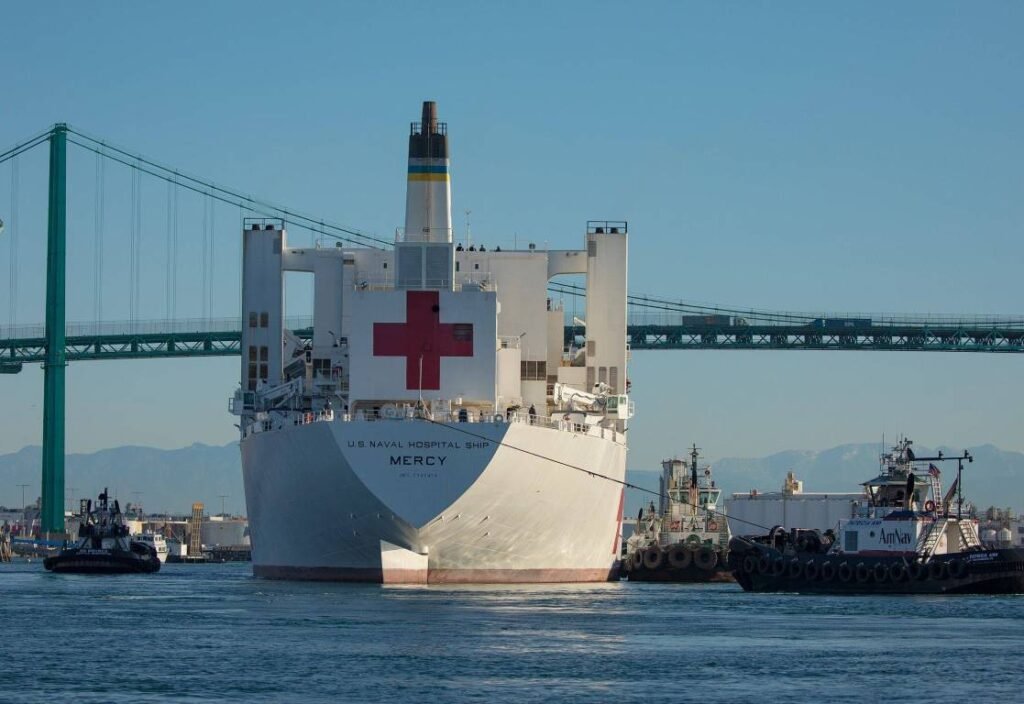Hospital ships are floating medical facilities designed to provide medical care and assistance to military personnel and civilians during times of war, natural disasters, or other humanitarian crises. These ships are equipped with medical facilities, equipment, and personnel to provide a range of medical services, including surgeries, emergency care, and long-term treatment.
Hospital ships can range in size and capacity, from smaller vessels to large, purpose-built ships. They may be operated by the military or by non-governmental organizations (NGOs) and may have a combination of civilian and military medical personnel on board.
Hospital ships are designed to be highly mobile and flexible, and can be deployed to areas where medical care is most needed. They may also have the ability to transport patients to hospitals on shore or to other medical facilities.
Hospital ships have played a crucial role in providing medical care during major conflicts and humanitarian crises throughout history. They offer a unique capability to provide medical care and assistance to those in need, even in remote or hostile environments.
As such, they have traditionally been spared from attack and given special treatment under military and maritime law. But what does the law say? Can hospital ships be attacked?
So Question is, Can Hospital Ships Be Attacked?
“No, the hospital ships cannot be attacked as per International law, but there are some conditions which need to be fulfilled!” Let’s discuss them in detail.
History of Hospital Ships and International Regulations
Hospital ships have existed since antiquity and were first used in the ancient Greek and Roman empires to transport wounded soldiers from the battlefield. They have been given special protection under international law and regulations throughout history. For example, the Geneva Convention of 1949 declared hospital ships to be “immune from attack” and “protected under all circumstances.” This was further clarified in the Second Protocol of 1977, which stated that “hospital ships shall be respected and protected in all circumstances, and shall not be the object of attack.”
Additionally, the US Navy has specific regulations for hospital ships which are outlined in the US Navy Regulations, Article 795, this article states that hospital ships shall not be subject to attack and that they must be respected and protected at all times.
Also read 10 Amazing Facts About the USS Gerald Ford
Conditions which need to be fulfilled by hospital Ships

It’s important that hospital ships aren’t used for any military purposes, so for transparency, they are not allowed to use encrypted means of communications otherwise they can be classified as a military object, can be given warnings to stop any military activities and even be attacked.
Legal and Ethical Implications of Attacking Hospital Ships
Attacking hospital ships is considered a serious violation of international humanitarian law (IHL) and may have legal and ethical implications. Here are some of the key implications:
- Violation of International Law: As I mentioned earlier, hospital ships are protected under the Geneva Convention of 1949, and attacking them is a clear violation of international law. Any person or group responsible for attacking a hospital ship can be prosecuted and punished under international law, including the Rome Statute of the International Criminal Court.
- Potential Loss of Life: Hospital ships are often deployed to provide medical care to wounded and sick military personnel and civilians, who may not have access to medical care otherwise. Attacking a hospital ship can result in the loss of life of these vulnerable populations, leading to significant ethical and moral concerns.
- Damage to Medical Infrastructure: Attacking a hospital ship can also cause significant damage to medical infrastructure, which may lead to the disruption of critical medical care and services. This can have long-term effects on the health and well-being of the population.
- Psychological Impact: Attacking a hospital ship can also have a significant psychological impact on the individuals involved, including the crew and medical personnel on board, as well as the patients and families receiving medical care. Such an attack may cause lasting trauma and emotional distress.
In summary, attacking hospital ships is considered a serious violation of international humanitarian law and can have significant legal, ethical, and moral implications. The protection of hospital ships is essential to ensure the provision of medical care and assistance to those in need during times of conflict and humanitarian crises.
Have there been attacks on Hospital Ships in the past? – Yes
Yes, there have been attacks on hospital ships in the past. Some examples include:
- World War II: During World War II, several hospital ships were attacked and sunk by enemy forces. For example, the British hospital ship HMHS Rohilla was torpedoed by a German submarine in 1914, resulting in the deaths of 85 people on board.
- Korean War: During the Korean War, the US Navy hospital ship USS Benevolence was attacked by North Korean aircraft in 1950, resulting in the deaths of 23 people on board.
- Gulf War: During the Gulf War in 1991, the US Navy hospital ship USNS Mercy was targeted by Iraqi forces, who fired missiles at the ship. However, the missiles missed their target, and no one was injured.
- Yemen Conflict: In 2015, a Saudi Arabian-led coalition was accused of attacking a Doctors Without Borders hospital ship, which was anchored off the coast of Yemen. The coalition denied responsibility for the attack, and the incident was condemned by the international community.
- In April 1945, SS Wilhelm Gustloff (which once was a hospital ship), was sunk by a Soviet submarine, resulting in the deaths of over 9,400 people.
In all of these cases, the attacks on hospital ships were considered serious violations of international humanitarian law and were widely condemned by the international community.

